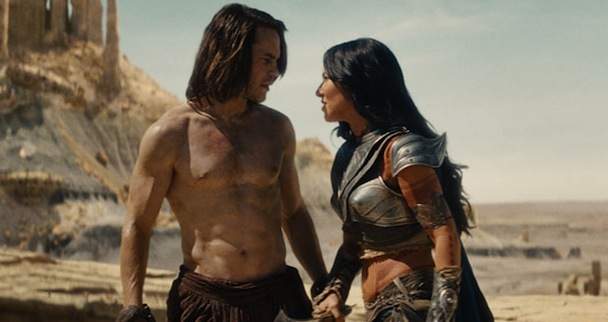John Carter
Film studios have been trying to make this legendary sci-fi epic for decades - and that might be the problem.
Overview
The epic, Western-tinged two-plus hours of John Carter flew by. I thoroughly enjoyed watching the film, which makes it odd that I'm about to spend most of this review digging into it. It's because I love you, John Carter people, and you were less than the sum of your parts.
Edgar Rice Burroughs' series of books about the exploits of teleported US Confederate soldier John Carter on the planet of Mars are legendary among fantasy fans. Like, Tolkien legendary. It paints a picture of Mars Barsoom in the local language as ridden with civil war that is killing the planet. The enlightened city of Helium is on the defence against the creeping, consumptive city Zodanga, but it will take the involvement of Carter and the hitherto neutral tribe of Tharks to tip things in their favour.
What happens on Barsoom is complicated, which is part of what makes it an absorbing, convincing, full world. Suffice it to say, there are good guys Carter (Taylor Kitsch), Princess Dejah (Lynn Collins) of Helium, self-sacrificing Thark Sola (voiced by Samantha Morton) and bad guys: Prince Sab Than (Dominic West) of Zadonga, the god-like Therns (led by Mark Strong), the tyrannical Thark Tal Hajus (voiced by Thomas Haden Church). The bad guys have all the tech, but the good guys have all the righteousness.
Studios have been trying to make John Carter into a movie for decades, and ultimately, that might be the problem. Even when it's fantastic, it feels old. It's not the fault of the visual effects, which, although they might not have the majesty of Avatar, are still rich, seamless and alive (oddly, only the make-up required to turn the humanoid Barsoomians red looks fake). There's just a different sensibility to the action/adventure/fantasy genre these days, and dream team director Andrew Stanton (WALL-E, Finding Nemo) and cowriters Michael Chabon (author of The Amazing Adventures of Kavalier & Clay, The Yiddish Policemen's Union) and Mark Andrews (another Pixar luminary) chose not to invoke it.
This is most apparent in characterisation. Despite the occasional charms both actors bring to the roles, crusaders and lovebirds Carter and Dejah are a little too perfect, a little too staid, a little too archetypal. They speak in grandiose non-communications. They are never tongue-in-cheek or self-referential. Perhaps that means John Carter will age handsomely, but in the present, it doesn't fit.
And that brings us to another gaping anachronism: No-one left on Earth thinks there may be life on Mars, now or anytime in the last 100 years. Space probes since the 1960s have told us so. When Burroughs wrote the series (1912-43), Mars hung heavy with possibility, but it no longer captures our imaginations in the same way. In fact, popular theories going around the internet suggest movies made about Mars are doomed to commercial failure, and Disney clocked on too late. Audiences are keen to suspend reality, but only when led into a compact by a tenable proposition. In this case, John Carter is saddled with a ridiculousness it doesn't deserve.
For those who prefer their adventure stories set in space, there's much to enjoy in John Carter, and you might even get original-trilogy-Star Wars-level tingles. But with a few key tweaks, it could have carried so much more critical and box-office weight, and that's the disappointment.





